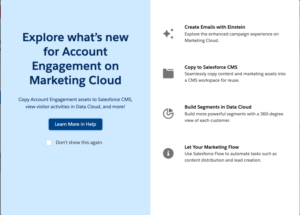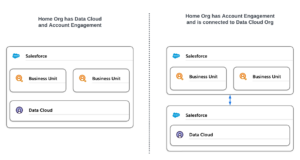UTF-8, or “Unicode Transformation Format, 8 Bit” is a marketing operations pro’s best friend when it comes to data imports and exports. It refers to how a file’s character data is encoded when moving files to and from Salesforce and Pardot. Read on to see why UTF-8 matters when it comes to CSV files.
You might have noticed when exporting reports from Salesforce, it gives you the option for a UTF-8 encoded excel or CSV.

You can also save an excel file as a UTF-8 encoded CSV when you do a “save as” operation, as well as 3 other types of CSV. The takeaway from this blog post is ALWAYS ALWAYS ALWAYS use the save as type CSV UTF-8 option when creating import files for Pardot or Salesforce.

What isn’t commonly understood is a UTF-8 encoded CSV is the preferred import format for Pardot! This fact is not mentioned anywhere, even in the considerations for importing documentation. But it’s absolutely essential because if there’s any chance at all that your dataset contains any of the following:
–You MUST use UTF-8 for the special characters to import properly!
Most commonly this occurs in people’s names, which is the absolute worst place for characters to be mis-encoded. Nobody who enters their name as Inès wants to be greeted by an email that says “Hello In?s”. But that is exactly what will happen if you don’t pay attention to your imports.
Here is a side by side example of what Greek and Japanese characters look like in an original Excel file (on the left, and what happens when that Excel file is saved and then re-opened as CSV UTF-8 (the middle) and regular CSV (the right).

What’s sneaky about this problem is that you could be happily working away on an excel file and everything looks fine, then when you’re finished, you save it to import into Pardot as a CSV, without paying attention to the encoding, and then José becomes Jos? — and you didn’t realize it because you never opened the CSV file after you created it!
Pardot saves records with characters in the UTF-8 format, which means that special characters or alphabets entered on a Pardot form will save with the original characters intact. Pardot provides UTF-8 encoded CSV export files. Salesforce, as mentioned, will export a UTF-8 CSV file as an option, and if you export an excel file it will preserve special characters as well.
Here are the most common scenarios when not paying attention to UTF-8 encoding will come back to bite you:
-
Exporting records from Pardot to do a data append or fix operation and neglecting to save the file for re-import as CSV UTF-8.
-
Exporting records from Salesforce to import into Pardot to do a record add, data append or fix operation and neglecting to export the file as UTF-8 or save the import file as UTF-8 (note: this presents somewhat less of a problem depending on how your record sync is set up. Any field where “use the most recently updated record” is the rule could be impacted by a faulty upload.
-
An imported list from a third party source such as a trade show, event, or partner. (With proper permission-based sourcing, of course!)
-
Transferring data due to decommissioning another marketing system and moving to Pardot.
The moral of the story and my mantra to all my clients: ALWAYS ALWAYS ALWAYS just use UTF-8 and you won’t have to worry about it.
This Pardot article written by: Bill Fetter
Unfettered Marketing
A collection of random thoughts on how people, places and things in our fascinating world connect to sales and marketing, and what we can learn from it.
Original Pardot Article: https://www.unfetteredmarketing.com/post/what-is-a-utf-8-csv-and-why-should-i-care
Find more great Pardot articles at https://www.unfetteredmarketing.com/blog
Pardot Experts Blog
We have categorized all the different Pardot articles by topics.
Pardot Topic Categories
- Account Based Marketing (ABM) (7)
- Business Units (14)
- ChatGPT / AI (3)
- Completion Actions (5)
- Connectors (10)
- Custom Redirects (4)
- Data Cloud (3)
- Demand Generation (8)
- Dynamic Content (7)
- Einstein Features (11)
- Email Delivery (17)
- Email Open Rates (3)
- Pardot A/B Testing (2)
- Email Mailability (16)
- Do Not Email (1)
- Double Opt-in (2)
- Opt Out / Unsubscribe (14)
- Email Preferences Page (6)
- Engagement Studio (16)
- Industries (1)
- Non Profit (1)
- Landing Pages (9)
- Lead Generation (1)
- Lead Management (13)
- Lead Routing (3)
- Lead Scoring (16)
- Leads (3)
- Marketing Analytics – B2BMA (9)
- Marketing Automation (1)
- Marketing Cloud (3)
- Marketing Cloud Account Engagement (4)
- Marketing Cloud Growth (2)
- New Pardot Features (6)
- Opportunities (2)
- Optimization (2)
- Pardot Admin (65)
- Duplicates (1)
- Marketing Ops (1)
- Pardot Alerts (1)
- Pardot API (2)
- Pardot Automations (3)
- Pardot Careers (12)
- Pardot Certifications (4)
- Pardot Consulting (1)
- Pardot Cookies (4)
- Pardot Custom Objects (3)
- Pardot Email Builder (8)
- Pardot Email Templates (10)
- HML (6)
- Pardot Events (17)
- Pardot External Actions (1)
- Pardot External Activities (4)
- Pardot Forms (29)
- Form Handlers (8)
- Pardot Integrations (21)
- Data Cloud (2)
- Slack (1)
- Pardot Lead Grading (5)
- Pardot Lead Source (2)
- Pardot Lightning (1)
- Pardot Migration (1)
- Pardot Nurture / Drip Campaigns (2)
- Pardot Personalization (3)
- Pardot Profiles (1)
- Pardot Releases (18)
- Pardot Sandboxes (2)
- Pardot Segmentation (5)
- Pardot Strategy (7)
- Pardot Sync (2)
- Pardot Sync Errors (1)
- Pardot Tracker Domains (5)
- Pardot Training (3)
- Pardot Vs Other MAPs (4)
- Pardot Website Tracking (2)
- Reporting (22)
- Salesforce and Pardot (31)
- Marketing Data Sharing (2)
- Pardot Users (3)
- Salesforce Automation (5)
- Salesforce Flows (2)
- Salesforce Campaigns (22)
- Salesforce CRM (3)
- Record Types (1)
- Salesforce Engage (3)
- Salesforce Queues (2)
- Security and Privacy (1)
- Tags (3)
- The Authors (540)
- Cheshire Impact (9)
- Greenkey Digital (55)
- Invado Solutions (37)
- Jenna Molby (9)
- Marcloud Consulting (6)
- Nebula Consulting (67)
- Pardot Geeks (44)
- Salesforce Ben | The Drip (242)
- SalesLabX (16)
- Slalom (4)
- Unfettered Marketing (51)
- Uncategorized (1)
- Website Tracking (2)
- Website Search (1)
More Pardot Articles
See all posts
This Pardot article written by: Bill Fetter
Unfettered Marketing
A collection of random thoughts on how people, places and things in our fascinating world connect to sales and marketing, and what we can learn from it.
Original Pardot Article: https://www.unfetteredmarketing.com/post/what-is-a-utf-8-csv-and-why-should-i-care
Find more great Pardot articles at https://www.unfetteredmarketing.com/blog







